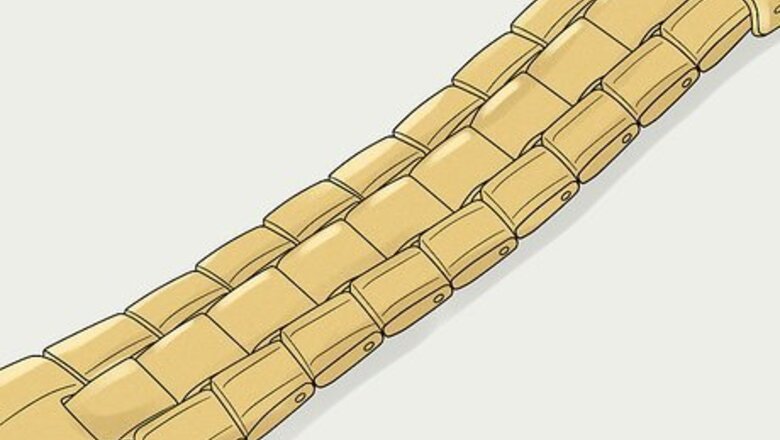
views
Measuring Your Watch’s Fit
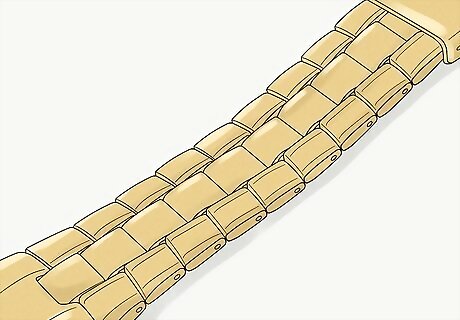
Check the band for pins if you’re unsure what kind of watch you have. There are a wide variety of watches in the world, and some of them are easier to adjust than others. Straight pins are very common, but some pins are L or U-shaped. You can spot these pins by looking along the sides of the bands for clues. Spread the links out as well to see if you can peek between them. The most common pins are straight ones. Look for a series of vertical pin holes on the edges of the bands. L-shaped pins look like horizontal bars over the links. That is only part of the pin. The vertical part of the “L” runs down to the opposite edge of the band. With U-shaped pins, your watch band looks like a series of vertical bars. The pins are actually underneath clips on each link. You may be able to see the clips curving down from the edges of the band. Mesh bands don’t have links at all. Instead, a mesh band is a solid piece of flexible metal. The clasp controls the fit.
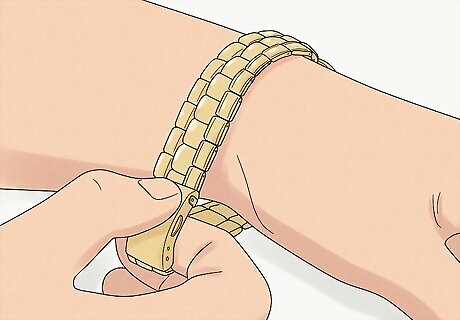
Set the watch on your wrist to determine how many links to remove. Slip the watch on like you would normally wear it, centering the clasp on the underside of your wrist. Pinch the band to remove all of the slack. Then, count the number of links you are able to pinch together to eliminate the slack. Make sure the band is relatively loose but not loose enough to slide across your wrist. At the right setting, it will stay put when you wear it. Try to measure it as accurately as possible so you don’t have to go back and make a second adjustment later.
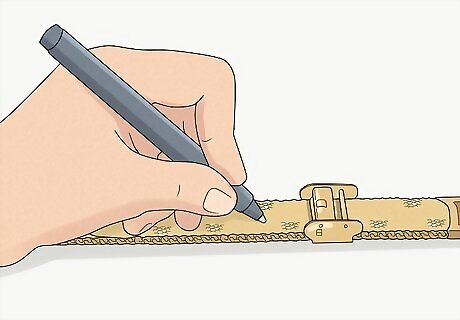
Make a mark with a water-based marker if you have a mesh band. Mesh bands are a little different since they don’t have individual links to remove. Instead, you adjust the band by moving the clasp. Put the watch on and make a mark where you wish to move the clasp in order to make the band fit your wrist. Use a simple marker like the kind young children use. These ones are easy to wash off with a towel and maybe a little bit of water. Avoid anything permanent, since you probably won’t enjoy an unpleasant mark on an otherwise flawless watch.
Fixing a Straight Pin Watch
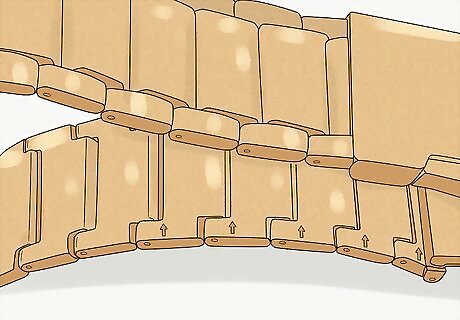
Identify the removable links by finding the arrows printed on them. The arrows make the removable links very easy to spot. Place the watch on a microfiber towel, turning it so the arrows point down. The pin holes will be on top so you can knock the pins out from the band. Some of the links may not have arrows on them. These ones aren’t meant to be removed. If your watch doesn’t have any arrows on it, look carefully at the pin holes. The pins will sit a little deeper inside the band on one side. Reach for them from that side.
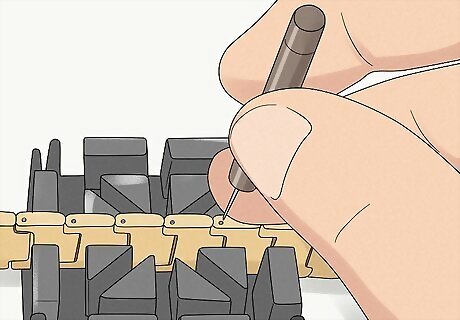
Align a pin push tool over the pin you wish to remove. You need something small in order to reach the pin. A pin push is little more than a handle with a needle on the end, but no watch pin can escape it. Set the point over the pin securing the link you wish to remove. You can find pin push tools online or at many hardware stores. Take the opportunity to also get a small hammer and any other gear you need for the adjustment. Some watches have screws instead of pins. They aren’t as common, but the screw heads will be noticeable on one end of the band if your watch has them. Use a small flathead screwdriver instead to remove the bands.
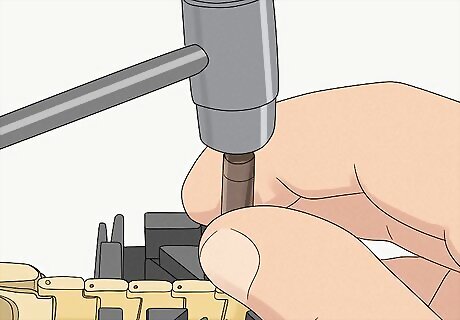
Use a small hammer to tap the push tool until the pin falls out. Tap, tap, tap to push the pin out as far as it will go. Any small hammer works well for this, including ball-peen hammers and even tack hammers. The key is to be cautious and tap gently to avoid damaging the watch. Tap the pin as far as you can get it to move. To make this part easier, get a watch working block to hold the watch in place. You could also cut a slit in a piece of foam and put the watch in it. If the pin doesn’t fall out on its own, grab it with your fingers or a pair of needle-nose pliers. Some watches have metal pin tubes called ferrules that fall out as you hammer. If your watch has these, set them aside to put back when you replace the pin.
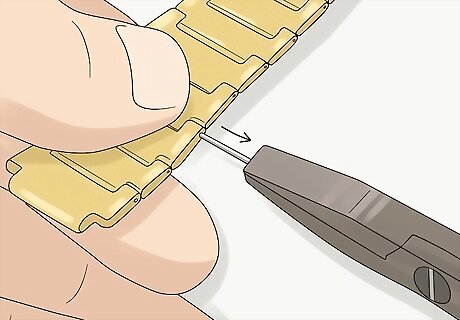
Remove the link and take out other pins as needed. Without the pin holding it in place, the link slides off the watch band. Set it aside for now. Continue adjusting the band by repeating the steps on any other links you wish to remove. To keep the band even, plan on removing links in pairs. You may wish to close the band and test the watch against your wrist again after each removal.
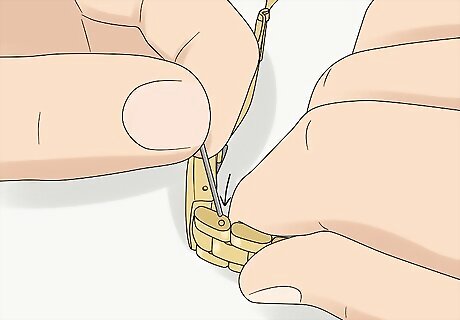
Put the pin back in place to fasten the band together. After removing a link, push the loose ends of the band together. Set the pin back in the pinhole, making sure you insert it from the correct end. Push the pin tip in first, then hammer the back end to push the pin into the band again. Push the pin toward the arrows on the band. The wider end of the pin will end up on top so you can then follow the direction of the arrows again next time you need to adjust the band. If your watch band had ferrules in it, remember to put one at both ends of the pinhole. Tap them in place with the hammer.
Detaching Links with L-Shaped Pins
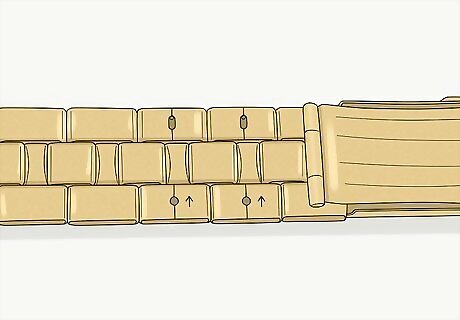
Find the arrows to see which links are removable. Your watch band may have small arrows printed on it. Lay the watch on a microfiber towel, then turn it so the arrows point down. This will bring the pins to the top so you can access them. If your watch doesn’t have arrows, inspect the edges of each link. If you see small horizontal bars on the links, then you might have an L-shaped pin.
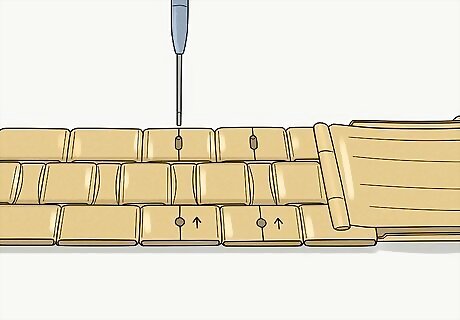
Slide the tip of a spring bar tool into the pinhole. Look for a small but noticeable hole on the sides of the pins between the links. If you have a spring bar tool, use it to easily leverage the pin. A spring bar tool is a small metal bar with a sharp point for removing pins. If you can, also set the watch in a watch band holder ot cut piece of foam to prevent it from moving as you work. You can get a spring bar tool online and at some hardware stores. If you don’t have a spring bar tool, try finding anything else with a sharp metal point. You could reach the pin using a small pair of pliers, for instance.
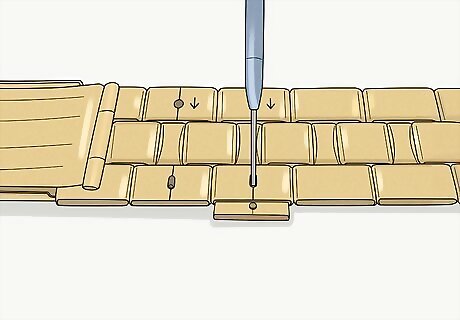
Push the pin up and out of the band using the spring bar tool. Leverage the tip of the spring bar into the hole. If you're using pliers, close the jaws together to lift the pin out of its slot. Eventually, you will see it come out from the top of the band. As soon as you are able to reach it, pluck it with your fingers to pull it the rest of the way out. The pointed end of spring bar tool is also useful for continuing to lift the pin if you aren’t able to hold onto it with your fingers.
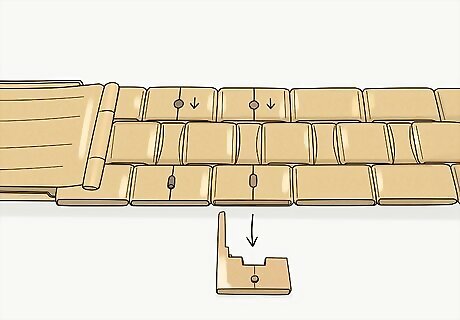
Slide the link out and remove other pins as needed. Complete the adjustment by taking care of all of the other links you planned on removing. You don’t need to close the band unless you plan on testing the fit after removing a link. Simply remove each individual pin. The links slide out of place with ease once the pins are gone. To keep the band even, consider removing a link from each end. Try to avoid taking off more links than you think you need, and close the band to test its fit if you’re not sure.
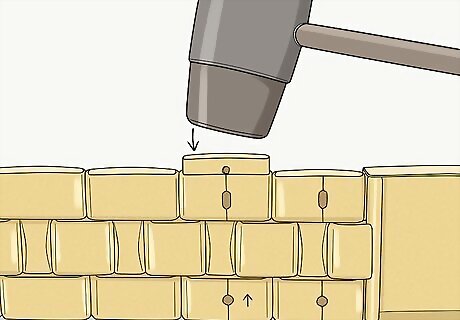
Hammer the pin back into place when you’re ready to close the band. After removing all of the bands you wish to remove, pull the loose ends back together. When putting an L pin back, insert the longer, vertical end first so the small pinhole is at the top of the watch. Slide the pin in, then tap it down with your hammer until it locks into place. Keep hammering the pin until it is flush with the top of the watch. The horizontal part of the pin will catch on the band and hide any gaps so your band looks like a single, continuous piece of metal.
Removing U-Clip Expansion Band Pins
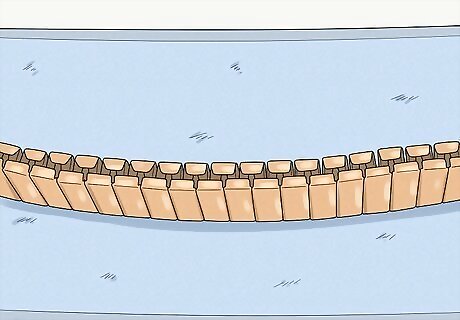
Place the band on a towel with the inside part face up. Lay down a microfiber cloth on a flat surface to avoid scratching the metal as you work. The tabs holding the links in place are on the edges of the band. These tabs are on both edges, so it doesn’t really matter which side you start on. You could also stand the watch on a block of wood. As long as the surface is smooth and stable, it won’t damage the watch.
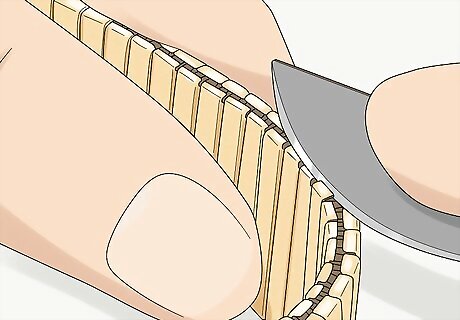
Pry open the tabs on the links with a utility knife. While pinning the watch against the towel, spread the links apart with your middle and index finger. Then, begin working on the edge of the band facing you. Each link is held in place by a pair of flat tabs, so slide your knife under the tabs and pull them toward you. Keep the band pinned down with your thumb until the tabs are flat and vertical like the links they protect. You could also use a spring bar tool, which is like a combination push pin tool and blade made specifically for watches. Many hardware stores carry them, along with any other tools you need, or you can order one online.
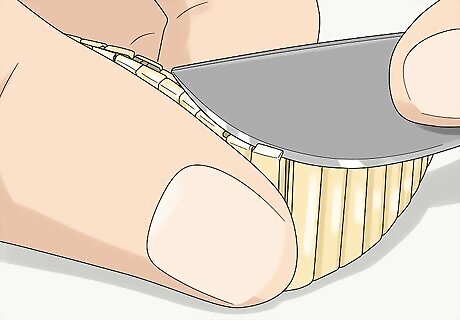
Turn the band around and open the tabs on the other side. The tabs aren’t perfectly aligned with the ones on the opposite end, so examine the watch to find the closest ones. Pry them back with caution, using the edge of a knife or another tool to lift them. Pull the tabs back until they are roughly parallel with the band to avoid bending them back too far. If you need to, pull them back with a pair of pliers. Stubborn tabs are easier to bend back this way.
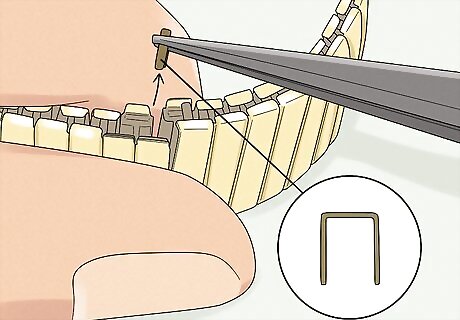
Pull out the U-shaped pins between the open tabs. The pins are small, so removing them is delicate work. Slip a small pair of needle-nose pliers or tweezers into the open space between the tabs. Each link has 2 to 3 pins that look like horizontal bars when you’re looking down through the band. Pull all of them out to loosen the link. The pins are on both sides of the band. After pulling a pin out, turn the band around and reach in from the other side. Getting all of the pins is a little easier if you approach them from both sides.
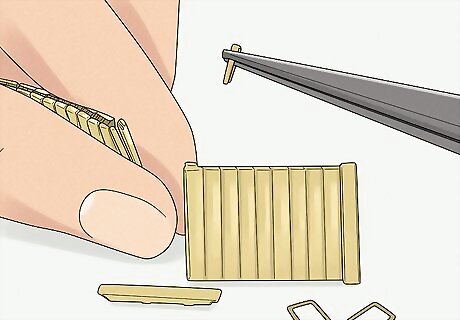
Remove more pins and links to shorten the band. After removing the pins, slide the link off the band and set it aside. Then, repeat the steps for any additional link you wish to remove. You will need to remove a series of pins for each link. It is a little tedious, but it isn’t too difficult when you take your time. Remove an even number of links to keep the band looking its best. To make the process easier, remove adjacent bands instead of alternating ends.
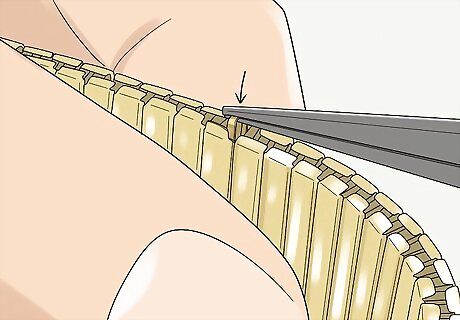
Reinsert the pins to close the band again. Push the loose ends of the band together to close it again, then start putting the pins back between the open tabs. Start with 1 of the pins, holding the horizontal part with tweezers. Fit each pin in one of the slots between the links. Then, push them down to get them level with the clips in the other links. You will need to do the same thing on the other side of the band. Sometimes you can put them both in right away without them falling right back out. If you can’t keep them in place, close the tabs on one end before putting the second pin back.
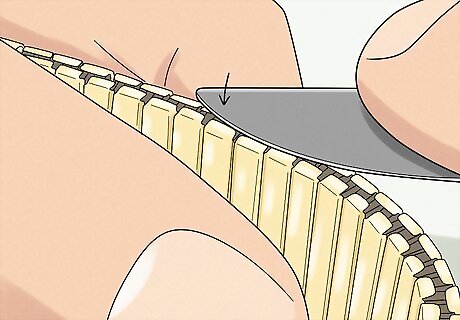
Push the tabs closed with a utility knife. Use the knife or the sharp end of a spring bar tool to flatten out the open tabs. Be gentle with them to avoid damaging them as you bend them back into position. Bend them so they lay flat against the rest of the band, holding the pins in place. To test it, try flipping the band over to see if the pins fall out. You don’t have to bend the tabs all the way over. As long as they look neat and hold the pins in place, you don’t need to mess with them. If you need to adjust the watch band again, consider working on a different set of tabs. The tabs weaken a little each time you bend them, so try to avoid opening the same tabs each time.
Using the Clip to Adjust Mesh Bands
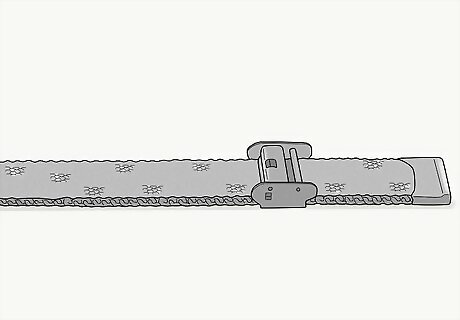
Lay the watch band flat and locate the clasp lever. Spread the watch band out on a microfiber towel with the clasp face up. Look inside the clasp to find the spot where the band passes through it. In that area, you will see a small bar running across the clasp, securing it to the band. You need that lever in order to adjust the band. The lever is often over a small hook that holds the clasp closed. It is a metal bar positioned over the mesh band that moves when you pry it up.
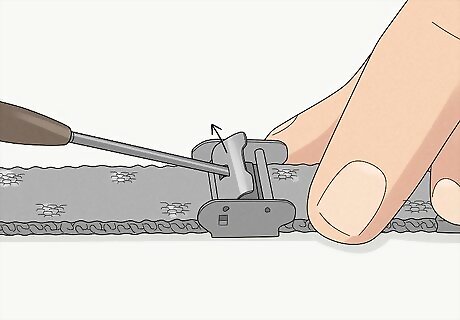
Reach the lever by sliding a small tool between the band and clasp. A watch spring bar tool works well if you have one, but you could also use a small flathead screwdriver. Most levers have small notches in them like big bullseyes. Slip the tip in and pull it back to open up the clasp. Basically, any small, pointed tool opens the clasp. You could even use something as small as a push pin if you’re out of options.
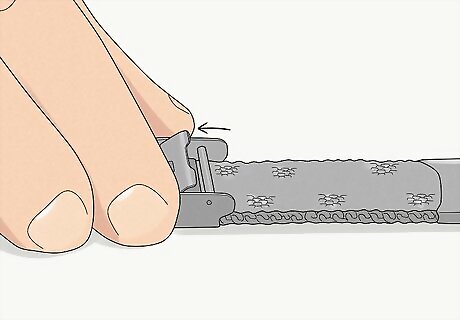
Slide the clasp along the band to adjust it. Once you release the watch clasp, adjusting the band is simple. The clasp will slide freely along the band, so position it where you need it. It helps a lot if you tested the band on your wrist ahead of time and marked the adjustment position with a water-based marker. Always measure out the band in advance to find the proper clasp position. Wipe off the marker when you’re done making the adjustment.
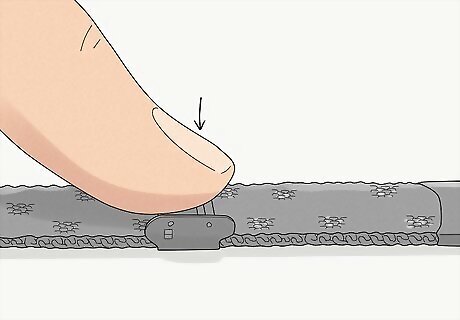
Push down on the metal lever to lock the clasp in place. Reach into the clasp with a pin push, which will be the opposite end of the spring bar tool if you’re using one. Set it on top of the lever, then bring it down as far as you can or until you hear it click. If it doesn’t click on its own, try pushing down on the clasp with your fingers or tap it down gently with a small hammer. You could also reach the lever with a small pair of needle-nose pliers. Set the pliers on top of the lever, then hit them gently with a hammer to push the lever down. When the clasp locks, the band won’t move around anymore. Make sure your watch is secure before putting it on.




















Comments
0 comment